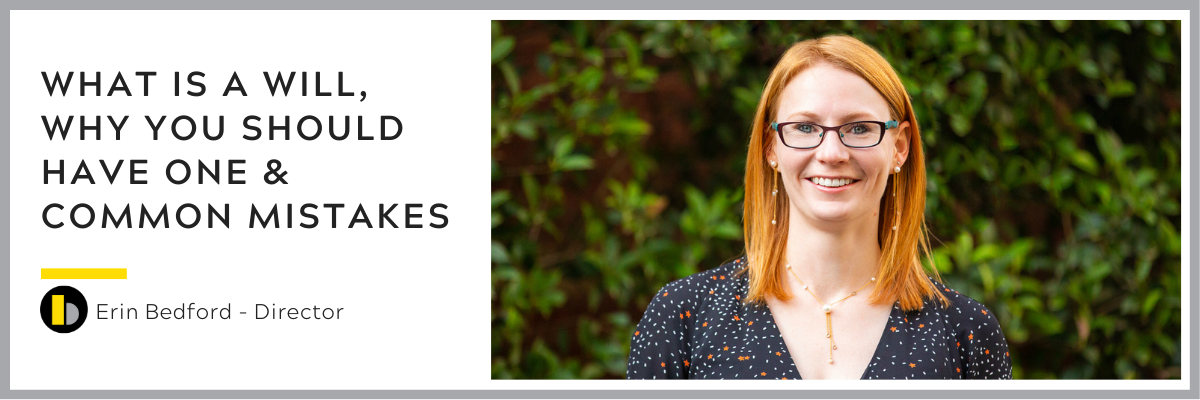
We all work hard to build our wealth, own our homes, and provide for our families. However, have you ever considered what will happen to your assets and your loved ones if something happens to you? That’s where having a Will comes in.
What is a Will?
A Will is the document in which you detail the following: –
who you wish to appoint as your Executors (the person or people responsible for implementing the instructions left in the Will).
- who will benefit from your Estate.
- the powers given to their Executors when administering your Estate.
- any wishes you may have regarding burial or cremation.
Having a Will ensures that your wishes are followed and your assets are distributed as you see fit.
Can my Will be challenged?
There is legislation that allows certain people to challenge what they receive from your Estate. This is known as an application for further provision, or a family provision application. Not just anyone is able to make this type of claim, they must fall within a list of relationships (mainly close family relationships, for example a spouse or child) (‘eligible person’). The Court considers a wide range of matters when assessing whether a claim made against an Estate should be allowed, and if so how much should be provided to the person making the claim.
Why should I have a Will?
Given the ability of an ‘eligible person’ to make a claim against an Estate, a common question is “Why should I have a Will when people can challenge what I say in it anyway?” My response is as follows: –
- If you make a Will, you make the choice of who will be the Executors of your Estate. This means you can choose the person/s you trust to administer your Estate, and if necessary, handling any claim made against it.
- You can say in your Will who will be the beneficiaries, what each will get and at what age in case of young people.
- You can even give reasons for your giving decisions if you wish, and you can certainly give directions about you wishes for your body after your death.
- If you don’t have a Will legislation decides who receives your Estate. This may not reflect what you want.
- Just because there is an ability to challenge a Will does not mean that it will be. Most Estates are administered without these claims arising.
- It is more costly to administer an Estate where a person does not leave a Will because the Court requires additional information to be provided.
Can I prepare my own Will?
Now, you might be thinking, “Why can’t I just write my own Will, can’t I just do one myself online or pick one up from the newsagent?”
Well, you certainly can, but there are many potential pitfalls to doing it yourself. One of the biggest problems with writing your own Will is that it may not be legally binding or enforceable which results in additional expense at the time the Will is implemented. For example: –
- If your Will isn’t signed or witnessed properly, it may not be considered a legally binding document. Similarly, if your Will doesn’t meet certain legal requirements, it may not be considered valid. This can lead to disputes between family members and potentially lengthy court battles, which is not what anyone wants.
- It may not accurately reflect your wishes. You may not be aware of all the legal requirements and restrictions that apply to the distribution of assets, and as a result, your Will may not be executed in the way that you intended. This can lead to confusion, conflict, and even legal action.
- Gifts contained in the Will fail. It is common for people to give a particular asset to a beneficiary (for example, I give my house to my friend Anne). If you don’t own this house at the time you die, then Anne will not receive this gift and may miss out altogether.
This is why it’s essential to have a lawyer create your Will. A lawyer can ensure that your Will is legally binding, enforceable, and accurately reflects your wishes.
Moreover, a lawyer can help you identify potential issues that may arise after you pass away. For example, if you have a child with special needs, a lawyer can help you set up a trust that will provide for them without impacting their eligibility for government benefits. Or, if you have a blended family, a lawyer can help you navigate the complexities of distributing assets among multiple spouses and children.
Creating a Will with the help of a lawyer is an investment in your family’s future. It provides peace of mind, knowing that your final wishes will be carried out and your family will be provided for. A lawyer can help you plan for the unexpected, ensuring that your family is taken care of in the event of your death.
If you have further questions or are uncertain about whether you should consider making a Will, please contact us, we are here to help.

Recent Comments